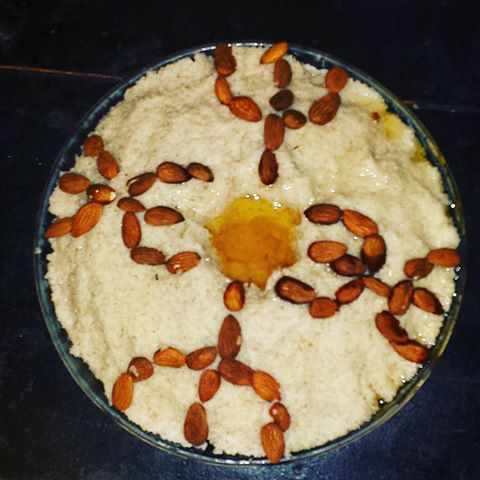Tagoula: the main dish of Amazigh New Year
Tagoulla, the main dish to celebrate the Amazigh New Year, holds significant cultural and culinary importance in the Amazigh community. This traditional dish not only represents a delicious meal but also embodies the spirit of celebration and unity.
It is a dish that brings families and communities together during the festive occasion of the Amazigh New Year. It is prepared with love and care, using a combination of local ingredients that reflect the rich heritage of the Amazigh culture.
Ingredients:
- 250 grams of barley grits, very roughly milled
- 2 liters of water
- 1 teaspoon of salt
For decoration
- Argan oil
- Honey
- Walnuts or almonds
Way of preparation:
Wash the barley grits well and drain them. Pour the water into a pan and add salt and barley grits.
Place the pan on the stove on high heat until the water is boiling, then turn the heat to low.
Simmer for about an hour and a half, and keep stirring with a wooden spoon until the grits are tender. Serve the tagoula on a plate, decorated with Argan oil and almonds or walnuts.

The preparation of Tagoulla involves meticulous attention to detail and a deep understanding of the culinary traditions associated with the Amazigh culture. From selecting the freshest ingredients to carefully layering flavors, every step in creating Tagoulla contributes to its distinct taste and significance.
Beyond its cultural significance, Tagoulla also offers a delightful culinary experience. Its complex flavors and comforting aromas make it an enticing choice for food enthusiasts seeking new gastronomic adventures.
Tagoulla holds great importance as the main dish to celebrate the Amazigh New Year. Its rich history, intricate preparation methods, and ability to bring people together make it an integral part of Amazigh culture. Whether you are discovering this tradition for the first time or savoring its familiar tastes once again, indulging in Tagoulla is sure to be an unforgettable experience that pays homage to centuries-old traditions.
Mariem Trifi

